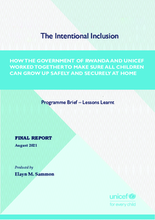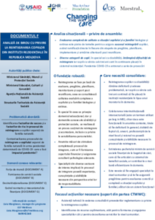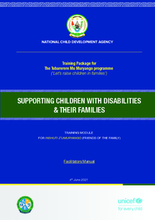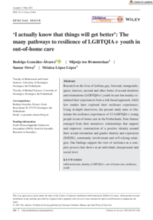Displaying 131 - 140 of 955
This series of resources are designed by care leavers for care leavers to help equip youth for life outside of care, strengthen coping strategies, foster safety nets and community networks. It builds from earlier life skills work that the Kenyan Society of Care Leavers has done, supported by Changing the Way We Care with global best practices.
This participants handbook has come into being by care leavers for care leavers. It has been developed based on the myriad of challenges shared and experienced by care leavers, hoping with the hope that it will support others leaving care.
This series of resources are designed by care leavers for care leavers to help equip youth for life outside of care, strengthen coping strategies, foster safety nets and community networks. It builds from earlier life skills work that the Kenyan Society of Care Leavers has done, supported by Changing the Way We Care with global best practices.
This present report describes the childcare reform process in Rwanda during 2020 and 2021, against the background of the overall reform initiated since 2012
Research suggests that children develop best in families, but millions currently reside in residential care centers. Using a mixed methods design, the current study examined (1) antecedents to transition, (2) key elements in the process and (3) outcomes of transitioning models of care.
Studiul a evaluat cunoștințele, atitudinile și practicile populației generale în ceea ce privește reintegrarea copiilor în familii, integrarea copiilor cu dizabilități în școala și comunitate și prevenirea separării copiilor care trăiesc în familii vulnerabile.
A fost efectuată o analiză de birou a studiilor de reintegrare din Moldova și a orientărilor globale pentru a identifica succesul și factorii de risc în cadrul procesului, precum și lecțiile importante învățate.
This is a Training Module for the Inshuti z’Umuryango volunteer community-based cadre to support the implementation of the Tubarerere Mu Muryango (TMM) Programme (‘Let’s raise children in families’) led by the National Child Development Agency (NCD).
Using in-depth interviews, the present study aims to illuminate the resilience experiences of 13 LGBTQIA+ young people in out-of-home care in the Netherlands.
In Vancouver, Western Canada, 60 agencies and 20 youth from government care are working in partnership using a collective impact approach to address the systemic issues and barriers to healthy development that youth from care experience. This mixed-method evaluation included quantitative and qualitative data, collected through outcomes, diaries, surveys, and focus groups, to measure process and outcomes.








